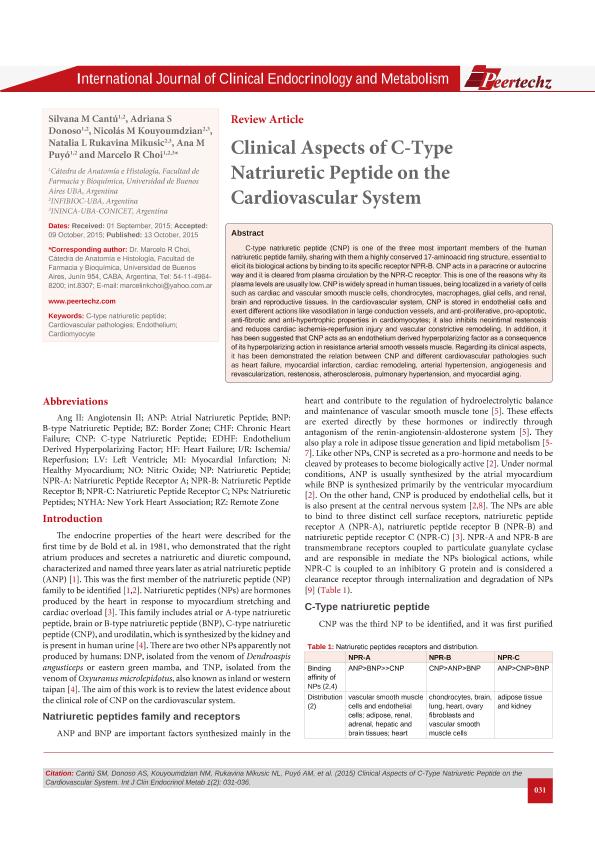Artículo
Clinical aspects of c-type natriuretic peptide on the cardiovascular system
Cantú, Silvana María; Donoso, Adriana Susana; Kouyoumdzian, Nicolás Martín ; Rukavina Mikusic, Natalia Lucía
; Rukavina Mikusic, Natalia Lucía ; Puyó, Ana María; Choi, Marcelo Roberto
; Puyó, Ana María; Choi, Marcelo Roberto
 ; Rukavina Mikusic, Natalia Lucía
; Rukavina Mikusic, Natalia Lucía ; Puyó, Ana María; Choi, Marcelo Roberto
; Puyó, Ana María; Choi, Marcelo Roberto
Fecha de publicación:
11/2015
Editorial:
Peertechz
Revista:
International Journal of Clinical Endocrinology and Metabolism
ISSN:
1685-1250
Idioma:
Inglés
Tipo de recurso:
Artículo publicado
Clasificación temática:
Resumen
C-type natriuretic peptide (CNP) is one of the three most important members of the human natriuretic peptide family, sharing with them a highly conserved 17-aminoacid ring structure, essential to elicit its biological actions by binding to its specific receptor NPR-B. CNP acts in a paracrine or autocrine way and it is cleared from plasma circulation by the NPR-C receptor. This is one of the reasons why its plasma levels are usually low. CNP is widely spread in human tissues, being localized in a variety of cells such as cardiac and vascular smooth muscle cells, chondrocytes, macrophages, glial cells, and renal, brain and reproductive tissues. In the cardiovascular system, CNP is stored in endothelial cells and exert different actions like vasodilation in large conduction vessels, and anti-proliferative, pro-apoptotic, anti-fibrotic and anti-hypertrophic properties in cardiomyocytes; it also inhibits neointimal restenosis and reduces cardiac ischemia-reperfusion injury and vascular constrictive remodeling. In addition, it has been suggested that CNP acts as an endothelium derived hyperpolarizing factor as a consequence of its hyperpolarizing action in resistance arterial smooth vessels muscle. Regarding its clinical aspects, it has been demonstrated the relation between CNP and different cardiovascular pathologies such as heart failure, myocardial infarction, cardiac remodeling, arterial hypertension, angiogenesis and revascularization, restenosis, atherosclerosis, pulmonary hypertension, and myocardial aging.
Palabras clave:
C Type Natriuretic Peptide
,
Cardiovascular
,
Clinical
,
Hypertension
Archivos asociados
Licencia
Identificadores
Colecciones
Articulos(ININCA)
Articulos de INST.DE INVEST.CARDIOLOGICAS (I)
Articulos de INST.DE INVEST.CARDIOLOGICAS (I)
Citación
Cantú, Silvana María; Donoso, Adriana Susana; Kouyoumdzian, Nicolás Martín; Rukavina Mikusic, Natalia Lucía; Puyó, Ana María; et al.; Clinical aspects of c-type natriuretic peptide on the cardiovascular system; Peertechz; International Journal of Clinical Endocrinology and Metabolism; 1; 1; 11-2015; 31-36
Compartir



